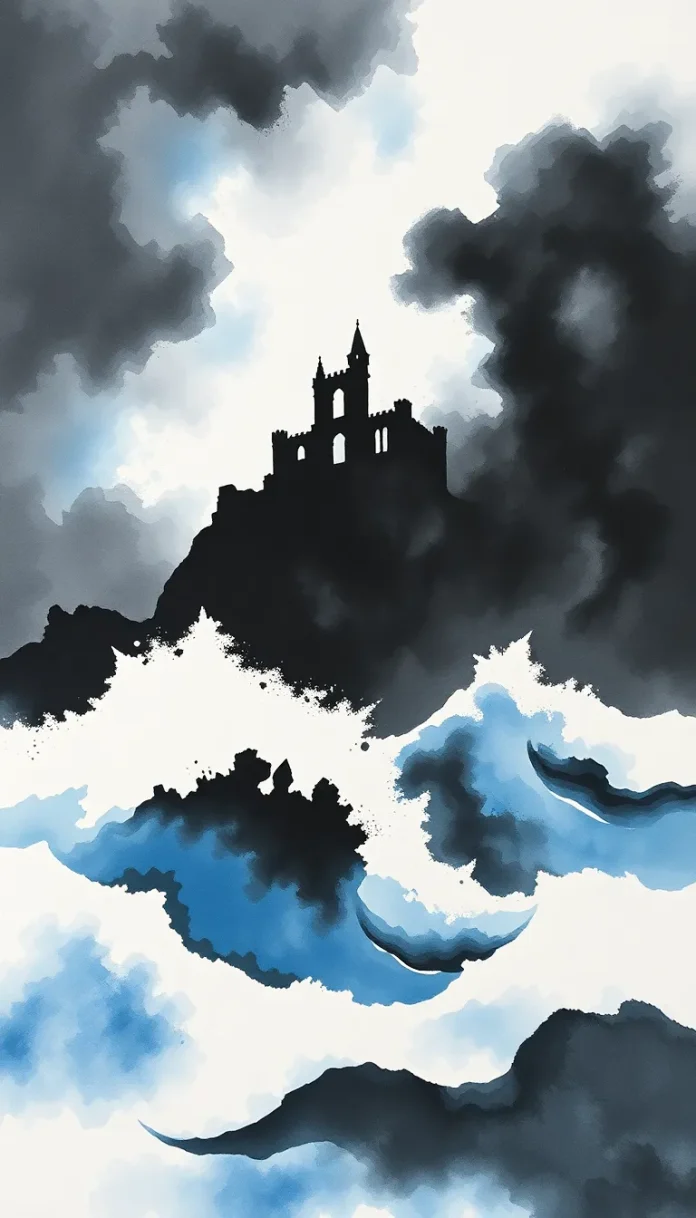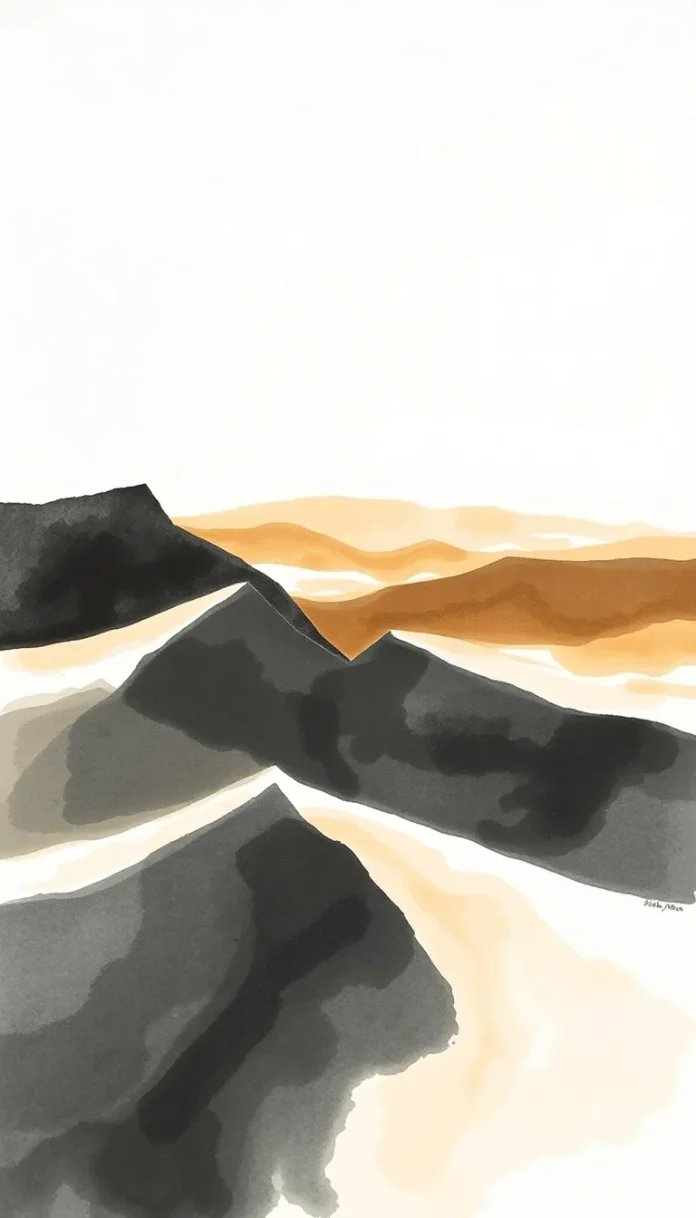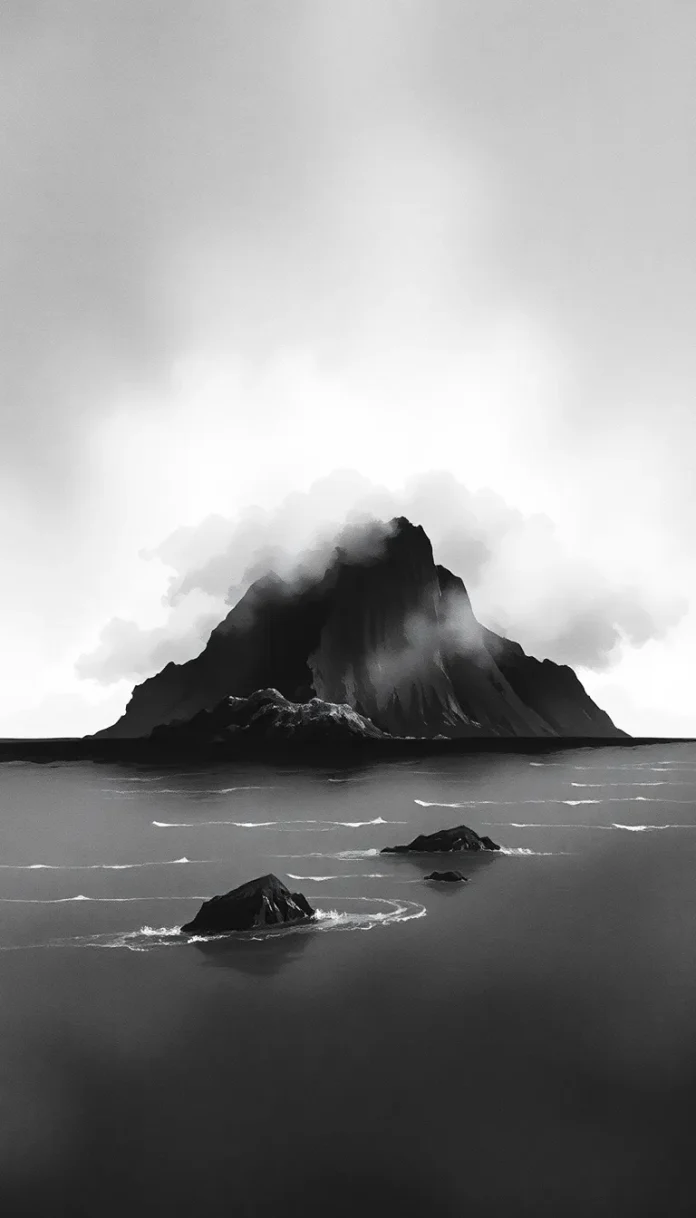Melancholy Shadows on the Rain-Kissed Stones
I.
Beneath a fragmented sky of ashen clouds and melancholy hues, Âme éplorée treads the sodden stones with measured steps, each echo a lament for a time unredeemed. The raindrops, like glistening pearls of sorrow, adorn the pavement, and in each droplet the images of lost moments appear—a reminiscence of once fervent dreams now surrendered to fate’s indifferent hand. The lonely wanderer muses:
“O night, whose dark embrace conceals
The visage of my scattered years—
Each tear a note, each step a dirge,
Bound by the sorrow that adheres.”
In this desolate realm both bleak and stern, where time seems arrested in a state of impotent grief, the cobblestones whisper of ancient regrets and unfulfilled desires. The rain, a constant refrain, weaves a somber tapestry about the past and the inexorable march of existence.
II.
Long ago, in quieter days of spring’s soft bloom, Âme éplorée had known a light—a fleeting moment of passion and hope, alive with the promise of tender affections. Yet fate is both merciless and enigmatic, for the gleam of that bygone love was soon eclipsed by the chilling shadow of regret. As the relentless downpour bore witness, the wanderer retraced the steps of yesteryear, each footfall summoning recollections dark as midnight:
“A smile once kindled light within,
A gaze that danced with ardor grand,
Now dulled beneath life’s ashen din—
A requiem for dreams unplanned.”
Thus, the sad figure of Âme éplorée embraced the perpetual rain, each drop a subtle caress that evoked the inexorable loss of innocence and the burden of choices unmade. The pavements, slick and unyielding, seemed to mock the fragility of mortal joy with their unchanging, stoic nature.
III.
Amid the silence of the deserted square, a distant murmur stirred—the murmur of memories and reflections. The past lived as a ghostly echo in each hollow corridor of the mind, and Âme éplorée found solace in the internal dialogue of sorrow. In the interstice between heart and solitude, the voice within questioned the worth of bygone passions and the futility of suspended yearning:
“Why dost thou linger on regrets,
When certainty is but a shade?
Must thou, with heart and soul beset,
Relinquish hope to darkness made?”
Yet, the intrinsic nature of the human spirit, though fraught with despair, cannot wholly renounce its longing for redemption. In quiet rebellion against despair, Âme éplorée’s inner soliloquy turned to a meditative cadence, revealing the paradox of existence where both the beauty of transient joys and the sting of regret are inextricably entwined.
IV.
In the midst of the rain’s ceaseless lament, memories unfolded like ancient scrolls, revealing a narrative of delicate love now marred by the inevitability of regret. The tender serenade of a beloved voice once filled the quiet halls of the wanderer’s heart; a harmonious promise that now withered beneath the relentless onslaught of time. The interplay of light and shadow recalled days of reflective mirth and whispered adieus:
“I remember well the twilight hours,
When hopes took flight on wings of ease,
And in thy eyes, like secret bowers,
I found a fortress ‘gainst life’s disease.”
Yet, as rust overtook the golden threads of affection, the fragile human spirit was left to navigate the labyrinth of remorse. The pavements, slick with the weight of time, bore witness to the fall of dreams—each drop of rain a reminder that love, as radiant as it may seem, is ever subject to fate’s indifferent decree.
V.
In a rare moment of introspection, as the downpour softened into a tender drizzle, Âme éplorée paused beneath the gnarled limb of an ancient oak whose leaves trembled in the wind. In the sparse companionship of nature’s melancholy grace, the solitary soul sought to reconcile with the inevitability of sadness. Here, amid the hushed soliloquy of rustling foliage, a dialogue emerged between the heart and the whispering breeze:
“O winds of change that brush my face,
What lesson doth thy passage bring?
Does nature weep for love’s lost grace,
Or sing of hope’s eternal spring?”
The breeze, insistent yet enigmatic, murmured in a language beyond words, offering neither comfort nor resolution—only the bittersweet acknowledgment of life’s transitory beauty. For in every graze of wind and drop of rain, the recurrence of the human condition was laid bare: full of contradictions, prayers unsaid, and passions left to languish in the cold void of time.
VI.
So, with heart heavy and eyes awash with sorrow, the wanderer resumed the solitary path along the old pavement—a path that wound its way through the ruins of memory and momentary solace. Each step was a silent elegy to what might have been, and every fragment of the past coalesced into the inexorable truth of mortality. In the clearest moments of introspection, one could almost see the ephemeral visage of that lost love, a ghostly apparition who, with furtive glances, beckoned from the recesses of time:
“Remember me in twilight’s gleam,
When all is faded and forlorn.
In every silent, tender dream,
My memory in thee is borne.”
Yet, this spectral immortalization, rather than soothing the ache of regret, only deepened the hollowness that had long resided in the soul of Âme éplorée. For every whispered promise recalled, a new pang of despair took root, and the delicate tapestry of existence seemed irrevocably stained by the deep hues of melancholy.
VII.
In the solitude of the deserted square, the expression of one’s inner torment had become the silent language of survival. There, each contemplative pause and every hushed murmur woven into the fabric of the rain hinted at the relentless battle waged between forbidden hope and the inexorable pull of remorse. Dialogue turned inward as the wanderer confronted the darker recesses of a soul confined within regret’s relentless embrace:
“I have walked these stones with burdened feet,
Seeking solace in the shroud of dusk;
But now I see, with heart laid bare and beat,
That all is lost to fate’s unyielding musk.”
And so, as the rivulets of rain continued to trace sorrowful patterns upon the ancient paving, the echo of regret grew louder than ever—a haunting refrain echoing the condition humaine. Even the very heavens seemed to weep for this tormented soul burdened by the weight of what might have been.
VIII.
As the hours dwindled in the relentless march toward a bleak midnight, the landscape transformed into a symphony of desolation. The deserted pavement, slick with the tears of the firmament, shimmered under the ghostly glow of a waning moon—a silent yet piercing witness to the passage of broken dreams. In that spectral light, Âme éplorée discerned the final vestiges of hope, fragile as a cobweb in the biting wind. Yet, realization dawned that the human spirit, bound by irrevocable regrets and the immutable decrees of life, is fated to mourn its own kind.
In a voice scarcely above the whisper of the rain, the wanderer spoke softly to the darkness:
“In this twilight of my aching heart,
I witness the fated course of days;
A life entombed in shadows doth impart
A dirge of sorrow in the silent grays.”
The lament was not solely for love disintegrated but for the very essence of human vulnerability—a condition defined by the ceaseless oscillation between fleeting joy and intemperate grief. This duality, as immutable as the turning of the seasons, rendered the pursuit of happiness a quixotic endeavour; a futile dance with destiny on the precipice of despair.
IX.
And so the narrative unwinds, a bittersweet ballad immortalized upon the ancient stones of a forgotten square. The rain, in its relentless cascade, enunciated the cadence of a life spent in quiet surrender to fate’s indifferent decree. Âme éplorée, emblematic of the human soul besieged by regret, moved inexorably toward an inevitable end—a collision of dreams and despair beneath the indifferent gaze of the night.
In one final, poignant soliloquy, the heartbroken figure beheld the silent truth:
“I am but a wanderer in the land
Where sorrow murmurs on the winds,
A solitary soul, by fate unmanned,
Bound to the truth that life rescinds.”
A forlorn acknowledgment of all that had been lost echoed like distant thunder in the caverns of the heart—a testament to a life spent in the twilight realm of regret. With each step, the phantom of lost hope wove a tapestry of despair too intricate to unravel, ensnaring the wanderer in an unyielding labyrinth of self-reproach.
X.
In the cold, bitter aftermath of memory’s ghostly parade, a final revelation emerged amid the dissonance of the rain and the eternal hum of the city’s abandoned streets. There existed no consoling reprieve, no sanctuary within the confines of a redeemed past, for the human condition is such that each soul must reckon individually with the chasms of its own regrets. The desolate pavement, scarred by the passage of time and the weight of innumerable sorrows, served as a silent monument to ephemeral desires and indelible scars left by life’s inexorable trials.
As the lonely wanderer paused upon a weathered step, cast in the pale glow of that sorrowful moon, a tragic certainty crystallized in the depths of sorrow:
“In the quiet decay of dreams unmet,
Lies the cold truth of our frail design;
For every heart, tormented and beset,
Must drown in regret’s relentless brine.”
Thus, with a heavy heart resigned to the inexorable sorrow, Âme éplorée continued along the endless avenue of regret. The rain, an eternal companion, wove together the final threads of a life lived in the shadow of forgotten hope.
XI.
In the last murmurs of that dreary night, when the echo of footsteps blurred with the soft lament of rain against desolate stone, the tragic poetry of this solitary existence reached its denouement. The figure, once luminous with the promise of youthful ardour, had become but an echo—a melancholy silhouette cast against the canvas of time, destined to fade like the ephemeral mist upon the old pavement.
“Farewell, sweet vestige of joy once known,
For now I surrender to the night’s cold woe;
The human soul’s eternal sorrow is shown,
As all our fervent dreams dissolve like snow.”
The lamentation, rendered in the hushed tones of a solitude too profound to articulate fully, whispered of possibilities forgone and destinies unfulfilled. In that final sigh of the wind and rain, the tragic reality of Âme éplorée’s existence was laid bare—a heart forever captive to regret, the poignant testament to the inescapable, melancholy truth of the human condition.
And so, under the relentless patter of rain on a forlorn kingdom of cobblestones, the epic of regret and tender sorrow met its inevitable conclusion. The endless droplets bore witness to a journey of insurmountable heartache—a journey where every step echoed a dirge of memories that no mortal might ever reclaim. For in the measure of every human life, the capricious interplay of hope and despair is the haunting refrain that resonates long after the final tear has fallen, leaving behind but a solitary echo on an old deserted pavement.
In the dim light of the approaching dawn, as the rain’s sorrowful hymn faded into a forlorn murmur, Âme éplorée vanished into the mist—a shadow of contrition and wistful pain, adrift in an ocean of irrevocable regret. Thus was cast the tragic fate of a solitary soul, whose journey, though heroic in its quiet endurance, concluded in the solemn realms of despair, its final note a mournful elegy for the enduring tragedy of the human spirit.


